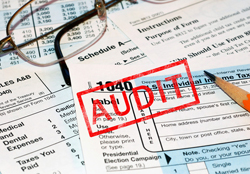Contents
Last updated: May. 27, 2013
 Tax returns that contain errors or omissions, accidental or intentional, are not uncommon.
Tax returns that contain errors or omissions, accidental or intentional, are not uncommon.
If you catch such an error on your tax return, it might be tempting to ignore it, especially if it’s in your favour. Don’t!
Simply hoping that the Canada Revenue Agency (CRA) doesn’t find out is not a recommended course of action. The risk of incurring penalties or a time-consuming and expensive CRA audit generally outweighs any savings.
Making Changes to Your Most Recent Tax Return
If you find an error on your most recent tax return that either increases or decreases your tax payable, you can make changes up to the later of one year from the filing deadline or 90 days after issuance of your most recent Notice of Assessment or Reassessment.
Additionally, CRA normally allows a change that applies to a previous tax year if it has been less than 3 years since you received a Notice of Assessment or Reassessment for the tax year in question.
Whatever the situation, CRA prefers that you not file an amended tax return. You can visit the CRA website to make a change online or write to the tax centre where you filed your return and explain the change(s).
Taking Advantage of CRA Voluntary Disclosures Program
While the Income Tax Act provides stiff penalties for deliberately failing to report income or claiming non-deductible expenses, CRA will permit you to resolve these issues without dire consequences if you come forward on your own.
CRA has a Voluntary Disclosures Program that encourages errant taxpayers to come clean. If you make a complete voluntary disclosure, no criminal charges, such as for tax evasion, will be laid. And no civil penalties will be applied. You will simply need to pay the tax you owe plus interest.
A voluntary disclosure must indeed be voluntary, meaning you’re not about to be, or already, under audit by the CRA. It must also be complete, meaning you disclose all omissions. As well, a monetary penalty must be involved, and at least some of your tax information must be one year or more overdue. (The last requirement prevents taxpayers from using this avenue to avoid late-filing penalties when their returns are just a few months overdue.)
Why get into this predicament in the first place?
